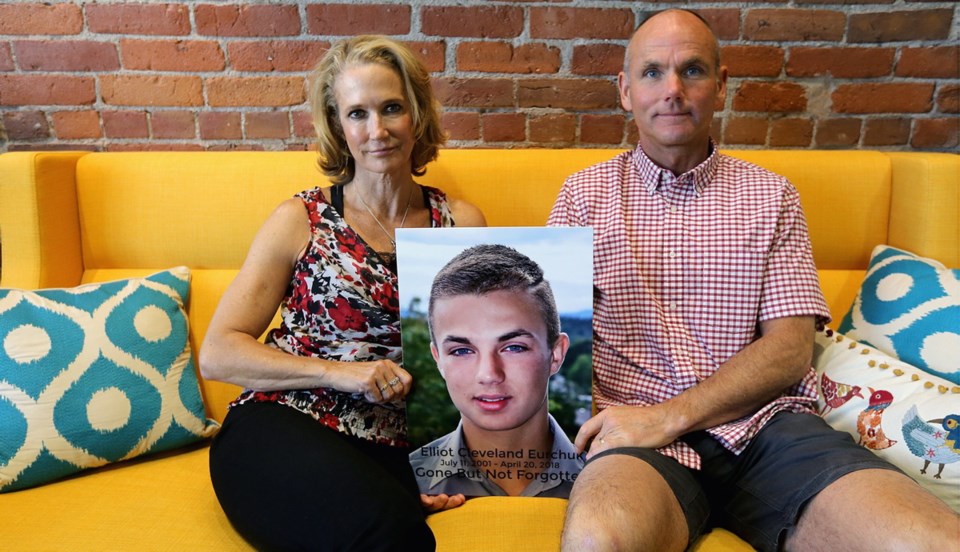Oak Bay teen Elliot Eurchuk died of mixed toxicology: a combination of cocaine, fentanyl, heroin and methamphetamine, says his mother.
Elliot, 16, died from an illicit drug overdose in his bedroom on April 20, 2018. His parents say painkillers prescribed before and after surgery for sports-related injuries led to an addiction that he fed with street drugs.
His mother, dentist Rachel Staples, said she was read the final toxicology and autopsy reports over the phone last month.
“He had extreme anxiety,” Staples said of her son, who wanted to be a physician. “I think he thought he was medicating himself.”
At the time of his death, a pill was found in Elliot’s wallet, suspected to be a street-level form of the anti-anxiety medication Xanax.
The Fraser Health Authority last week issued a warning about fake Xanax pills being tainted with a synthetic opioid and a cannabinoid.
“These drugs are literally being scraped off the lab countertops,” Staples said. “They are pressed into a pill and then shipped to Canada [from China].”
The toxicology results have renewed a call by Staples and her husband, Brock Eurchuk, for B.C. coroner Lisa Lapointe to hold an inquest into their son’s death.
“It was nine months [Jan. 20] since he passed away and it just doesn’t get any easier,” Staples said. “You just have to learn to live with the grief that swells up inside you.
“It’s a different way of living than I ever imagined,” she said. “They say you walk with the grief and that’s exactly what it is. You just have to walk every day with that hole inside you and pray he’s in a better place.”
Lapointe was not available to comment.
B.C. Coroners Service spokesman Andy Watson said: “The investigation remains open and it’s premature to say at this stage if an inquest will or will not be held.”
Staples found her son dead in his bedroom; her scream alerted her husband. She tried unsuccessfully to revive Elliot, who has two younger brothers.
Their battle to save their son’s life, however, predates that morning. It goes back to when they first questioned doctors and later forbade them from giving their son opioids for pre- and post-surgery pain — only to be ignored. It goes back to when they begged physicians to give them access to their son’s medical information, including lab test results that would have confirmed he was taking street drugs.
Elliot’s parents maintain the health care system, the mental health care system, the education system and the justice system all failed them. They believe shining a light into all the corners of their son’s journey will help prevent similar deaths.
Victoria lawyer Michael Scherr of Pearlman Lindholm, representing the family, said the coroner’s office is best suited to preside over an investigation aimed at making recommendations to social workers, health-care practitioners, school administrators, peace officers and parents.
“I’m trying to think if there was any area in this whole thing that worked, any level, and there really wasn’t anything that was a useful resource for us as parents,” Staples said. For example: Elliot was expelled from school rather than counselled for an addiction; he was discharged from hospital despite having overdosed in his hospital bed days earlier; and when, as a last resort, he was committed by his parents under the Mental Health Act in order to get him drug-addiction treatment, it proved to be more injurious than helpful and he was discharged without counselling or being admitted to a treatment bed, Staples said.
“Not one person offered that boy — who had gone through so much — any kind of clinical counselling related to his dependency,” Staples said. “They didn’t even talk to him about having a dependency. I think he knew, but he needed someone with some credentials behind them, other than his mother, to tell him that this was not something he could manage on his own.”
The couple also want a review and overhaul of the B.C. Infants Act, which says anyone under the age of 19 can consent to their own medical care if a health care provider agrees with the treatment and assesses the patient as competent to understand the risks and benefits. This allowed Elliot to dictate his own prescribed drug regime and to bar his parents from seeing his medical record and test results.
The B.C. Coroners Service would not confirm whether Elliot’s toxicology report has been completed nor would it offer a timeline as to when a decision on an inquest will be forthcoming.
When “all the necessary reports [such as autopsy and toxicology] are received … the chief coroner will then review the file in detail and make a decision,” Watson said.
“The family’s views are certainly taken into account in that review.”



